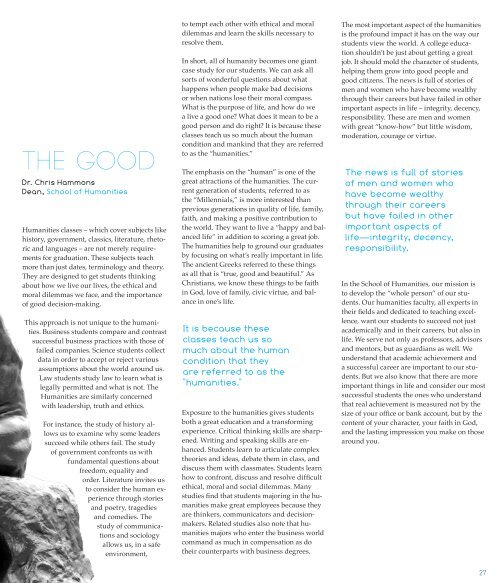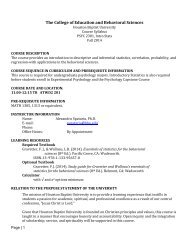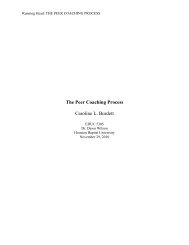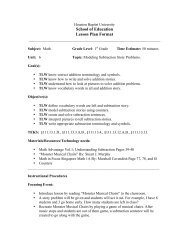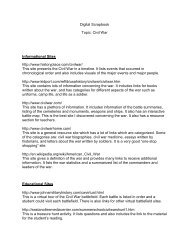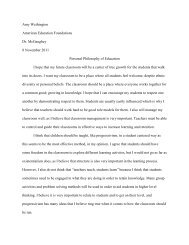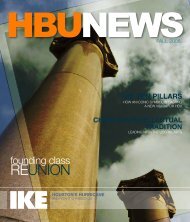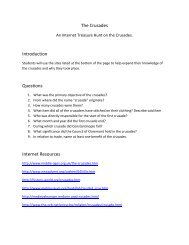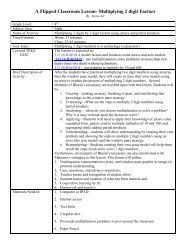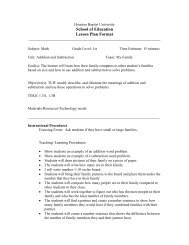Volume 50, #1 - Spring 2013 - Houston Baptist University
Volume 50, #1 - Spring 2013 - Houston Baptist University
Volume 50, #1 - Spring 2013 - Houston Baptist University
- No tags were found...
You also want an ePaper? Increase the reach of your titles
YUMPU automatically turns print PDFs into web optimized ePapers that Google loves.
the goodDr. Chris HammonsDean, School of HumanitiesHumanities classes – which cover subjects likehistory, government, classics, literature, rhetoricand languages – are not merely requirementsfor graduation. These subjects teachmore than just dates, terminology and theory.They are designed to get students thinkingabout how we live our lives, the ethical andmoral dilemmas we face, and the importanceof good decision-making.This approach is not unique to the humanities.Business students compare and contrastsuccessful business practices with those offailed companies. Science students collectdata in order to accept or reject variousassumptions about the world around us.Law students study law to learn what islegally permitted and what is not. TheHumanities are similarly concernedwith leadership, truth and ethics.For instance, the study of history allowsus to examine why some leaderssucceed while others fail. The studyof government confronts us withfundamental questions aboutfreedom, equality andorder. Literature invites usto consider the human experiencethrough storiesand poetry, tragediesand comedies. Thestudy of communicationsand sociologyallows us, in a safeenvironment,to tempt each other with ethical and moraldilemmas and learn the skills necessary toresolve them.In short, all of humanity becomes one giantcase study for our students. We can ask allsorts of wonderful questions about whathappens when people make bad decisionsor when nations lose their moral compass.What is the purpose of life, and how do wea live a good one? What does it mean to be agood person and do right? It is because theseclasses teach us so much about the humancondition and mankind that they are referredto as the “humanities.”The emphasis on the “human” is one of thegreat attractions of the humanities. The currentgeneration of students, referred to asthe “Millennials,” is more interested thanprevious generations in quality of life, family,faith, and making a positive contribution tothe world. They want to live a “happy and balancedlife” in addition to scoring a great job.The humanities help to ground our graduatesby focusing on what’s really important in life.The ancient Greeks referred to these thingsas all that is “true, good and beautiful.” AsChristians, we know these things to be faithin God, love of family, civic virtue, and balancein one’s life.It is because theseclasses teach us somuch about the humancondition that theyare referred to as the"humanities."Exposure to the humanities gives studentsboth a great education and a transformingexperience. Critical thinking skills are sharpened.Writing and speaking skills are enhanced.Students learn to articulate complextheories and ideas, debate them in class, anddiscuss them with classmates. Students learnhow to confront, discuss and resolve difficultethical, moral and social dilemmas. Manystudies find that students majoring in the humanitiesmake great employees because theyare thinkers, communicators and decisionmakers.Related studies also note that humanitiesmajors who enter the business worldcommand as much in compensation as dotheir counterparts with business degrees.The most important aspect of the humanitiesis the profound impact it has on the way ourstudents view the world. A college educationshouldn’t be just about getting a greatjob. It should mold the character of students,helping them grow into good people andgood citizens. The news is full of stories ofmen and women who have become wealthythrough their careers but have failed in otherimportant aspects in life – integrity, decency,responsibility. These are men and womenwith great “know-how” but little wisdom,moderation, courage or virtue.The news is full of storiesof men and women whohave become wealthythrough their careersbut have failed in otherimportant aspects oflife—integrity, decency,responsibility.In the School of Humanities, our mission isto develop the “whole person” of our students.Our humanities faculty, all experts intheir fields and dedicated to teaching excellence,want our students to succeed not justacademically and in their careers, but also inlife. We serve not only as professors, advisorsand mentors, but as guardians as well. Weunderstand that academic achievement anda successful career are important to our students.But we also know that there are moreimportant things in life and consider our mostsuccessful students the ones who understandthat real achievement is measured not by thesize of your office or bank account, but by thecontent of your character, your faith in God,and the lasting impression you make on thosearound you.27


